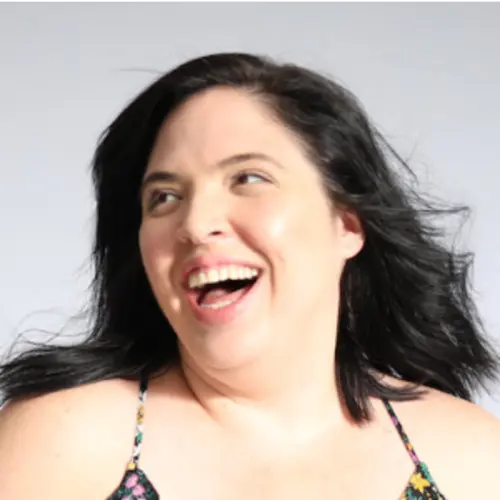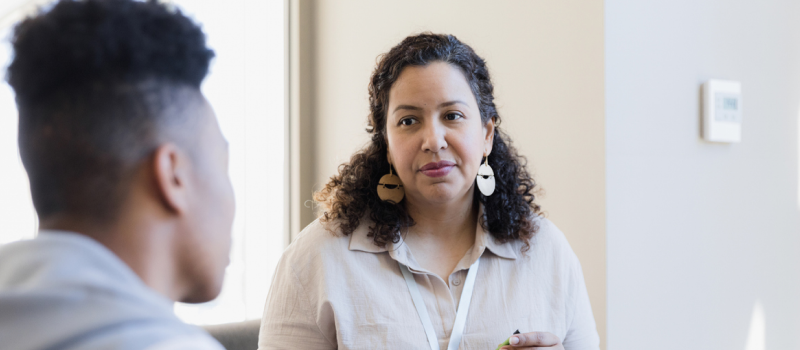
Table of Contents
8 Alternatives to Inpatient Treatment for Mental Health and Substance Use Disorders

Written By: Sarah duRivage-Jacobs

Clinically Reviewed By: Dr. Don Gasparini
June 8, 2023
8 min.
Inpatient treatment isn’t right for everyone. Here are 8 effective alternatives to inpatient treatment for young people with mental health conditions and substance use disorders.
Learn more about our Clinical Review Process
Table of Contents
As experts have learned more about how our brains work and why we behave in the ways we do, opportunities for mental health and substance use treatment have also increased.
Thankfully, for most people who are struggling, there’s a form of treatment that can help. Young people who are in crisis or who might pose a danger to themselves or others may be advised to pursue inpatient treatment – the most intensive care model that offers 24-hour support and supervision – either at a psychiatric hospital or a residential treatment center. Inpatient treatment is typically covered by insurance and has been shown to be effective.
Young people who are dealing with mental health challenges but not in need of inpatient care may wonder what kind of outpatient treatment might be right for them. Is one hour a week of therapy enough? What options take insurance, and which ones don’t? Here, we’re providing an overview of the many alternatives to inpatient treatment, so you or your teen can find the appropriate level of care.

Find out today if virtual IOP is the right fit for yourself or a loved one
Alternatives to inpatient treatment for mental health
For people who can choose where they access treatment, outpatient treatment may be preferable to inpatient treatment because it doesn’t put someone’s life on hold—and it creates opportunities for practicing and implementing new skills in daily life.
Knowing the different outpatient treatment programs available can help you or your loved one find the right level of care.
Partial hospitalization programs
Partial hospitalization programs (PHPs) are a form of mental health treatment that, in terms of intensiveness, falls between inpatient programs and outpatient clinic-level programs. Good candidates for PHPs are young people who need more support than outpatient programs but don’t need 24-hour care at a residential facility. In a typical PHP, patients will attend in-person treatment for several hours a day, multiple days a week, and receive additional care (such as group sessions and medication management) as needed.
While the research investigating PHPs for adolescents is not as extensive as it could be, specific programs—such as those focused on dialectical behavioral therapy and another focused on cognitive behavioral therapy—have shown positive outcomes for adolescent patients.
PHPs are typically covered by insurance.
Intensive outpatient programs
Intensive outpatient programs (IOPs) are more intensive than traditional outpatient care but less intensive than inpatient care or partial hospitalization programs. IOPs are a good option for young people who would benefit from a higher level of care than weekly psychotherapy sessions alone but don’t need 24-hour treatment and supervision.
Because IOPs require fewer hours per week than PHPs, they make it easier for people to maintain their daily schedules and responsibilities while accessing intensive mental health treatment.
IOPs are effective for treating mental health conditions, substance use, and other issues related to mental health and emotional well-being. IOPs typically encompass support group sessions with peers, individual therapy, and family therapy.
Research on IOPs demonstrates that programs can have a higher success rate than other outpatient treatment approaches. The IOP model can also help treat symptoms, reduce crisis events, improve functioning, and reduce inpatient readmissions. The model can be especially beneficial for young people because they can continue to go to school or work, maintain social relationships, and remain at home — all of which can impact depressive symptoms.
IOPs are typically covered by insurance.
Individual therapy
In individual therapy sessions with a licensed clinician, young people can open up about what they’re feeling, experiencing, and finding difficult to manage. Therapy can cover day-to-day challenges and go deep into past traumas and conflicts.
There are many therapeutic modalities to choose from, and some are more effective than others, depending on the issues at hand. For example, cognitive behavioral therapy (CBT) is the clinical standard for anxiety disorders, including post traumatic distress disorder, while dialectical behavior therapy (DBT) was created for people experiencing borderline personality disorder. For some, a combination of several modalities—in addition to medication management, when needed—will be the best treatment.
Many, though not all, therapists accept insurance.
Group sessions
Group sessions, like individual therapy, is led by expert behavioral health professionals. However, in group sessions, participants can benefit from hearing other people’s stories and building connections. Group sessions can focus on managing certain life experiences, such as grief, or developing skills.
When compared to individual therapy, group sessions can be just as effective for treating many mental health conditions, including depression, anxiety disorders, bipolar disorders, borderline personality disorder, schizophrenia, eating disorders, and substance use disorders. Group sessions are also beneficial in building community and reducing stigma among peers, especially for people from historically marginalized groups.
Some group session providers may accept insurance.
Medication management
Medication management can be used on its own or in combination with non-pharmacological treatment for mental health conditions. Effective psychiatric medications prescribed among adolescents by licensed clinicians include antidepressants, antipsychotics, mood stabilizers, and anti-anxiety medications.
Most providers of medication management are covered by insurance.
Medication-assisted treatment
Medication-assisted treatment (MAT) is when substance use disorders like opioid use disorder (OUD) and alcohol use disorder (AUD) are treated using a combination of medication and therapy.
The medications used for the treatment of OUD include:
- Methadone
- Buprenorphine
- Buprenorphine-naloxone
- Naltrexone
The medications typically used for the treatment of AUD are naltrexone and acamprosate.
MAT is shown to be very effective in key indicators of success like treatment retention, decreasing substance use, reducing the likelihood of hospitalization, and lowering mortality rates.
Most medication-assisted treatment programs are covered by insurance.

Twelve-step programs
The twelve-step model was first developed in Alcoholics Anonymous (AA) but has since evolved to mutual support groups throughout and beyond substance use recovery. Central tenets of the twelve-step program are admitting that the individual is powerless over their issue, finding strength in a higher power, working with a sponsor to look at past mistakes, making amends for those mistakes, creating a new life, and helping others.
Twelve-step mutual support groups like AA are among the most effective programs for continuing to abstain from alcohol use—and they’re also free. Both AA and Narcotics Anonymous (NA)have been shown to be effective for continuing attendance and maintaining abstinence.
While twelve-step programs are less studied among youth, getting support from groups with similar-aged members may be especially helpful for some adolescents in recovery—and they may also be beneficial after substance use treatment programs.
SMART Recovery
Similar to twelve-step programs, SMART (Self-Management and Recovery Training) Recovery is a free mutual support group for people with addiction recovery goals. SMART is a skills-based program focused on four points: 1) Building and maintaining motivation, 2) coping with urges, 3) managing thoughts, feelings, and behaviors, and 4) living a balanced life.
Research shows that SMART Recovery can lead to positive outcomes for people with alcohol use disorder, but there’s no conclusive evidence for its effectiveness and utility. However, for adolescents who don’t feel comfortable with the spiritual elements of AA, SMART Recovery programs may be a good option.
Intensive outpatient treatment at Charlie Health
Charlie Health’s IOP is a virtual program designed for teens and young adults.. Our IOP is completely virtual, which allows clients to maintain their daily lives while getting the high-touch mental health treatment they need.
Virtual IOPs like Charlie Health’s can be beneficial for people who have difficulty accessing in-person treatment because of physical or financial barriers, as well as those who feel more comfortable receiving care from home. They can also be helpful for full-time students or employees who can’t hit the pause button on life. We believe that everyone deserves access to the care they need, so we accept major insurance plans and offer both evening and weekend sessions.
The program, which typically lasts 9-12 weeks, is personalized for each individual’s needs and preferences. An average week of treatment will include:
Facilitated group sessions
A core component of Charlie Health’s IOP is the facilitated group sessions, which meet three days a week for three hours per session.
We believe that social support and community are key aspects of healing and recovery. So, to make sure every client is in the best group for their needs and preferences, we’ll conduct a data-driven matching process considering age, history, and therapeutic goals.
Individual therapy
Each Charlie Health client will also be paired with a primary therapist for one-hour weekly sessions. Our therapists specialize in various therapeutic modalities and will pull from the modalities that will support our clients best.
Family therapy
Involving family members in care greatly impacts the effectiveness of treatment. It also ensures that family members are on the same page and can continue helping their loved ones meet their goals between sessions. All clients will have family therapy 1-2 hours a week with clinicians specializing in evidence-based family therapy treatment techniques. Families can also participate in family support programming and special events to increase family members’ knowledge of and ability to support their loved one’s treatment.
Clinical outcomes
In November of 2022, we published our clinical outcomes in the Journal of Medical Internet Research. According to our research:
- Young people who received care at Charlie Health attended 91% of scheduled sessions (the industry average is 65%).
- Clients reported 60% fewer depressive symptoms.
- More than half of all clients who had previously reported self-harm behaviors were no longer self-harming upon discharge.
- 71% of clients who reported active suicidal ideation at intake no longer reported suicidality upon discharge.
- There were no statistically significant differences in outcomes observed between clients with public and private health insurance.
Making the right choice for you or your teen
Every individual’s treatment needs are different, and no two pathways to care will look the same. Outpatient treatment options can also be combined to find the right holistic plan for you or your teen. Some programs, like Charlie Health’s IOP, blend different modalities and structures to provide comprehensive and sustainable treatment for mental health conditions and substance use disorders.
If you or your teen believe a higher level of support could be the right fit, our team of expert mental health clinicians will conduct a clinical assessment to help you figure that out. We can also refer you to additional programs as needed. Our clinicians are experienced in treating people ages 12-28 who are managing anxiety disorders, behavioral issues, depression, dissociative disorders, gender identity and dysphoria, mood disorders, personality disorders, self harm, substance use disorders and other forms of addiction, and trauma.
The wide variety of outpatient programs means an option is available for everyone. There’s no shame in needing treatment—and there’s no shame in requiring a higher touch than weekly psychotherapy sessions. If that’s the case for you or your teen, reach out to Charlie Health today. We’re available 24/7 to help you get the care you need.




